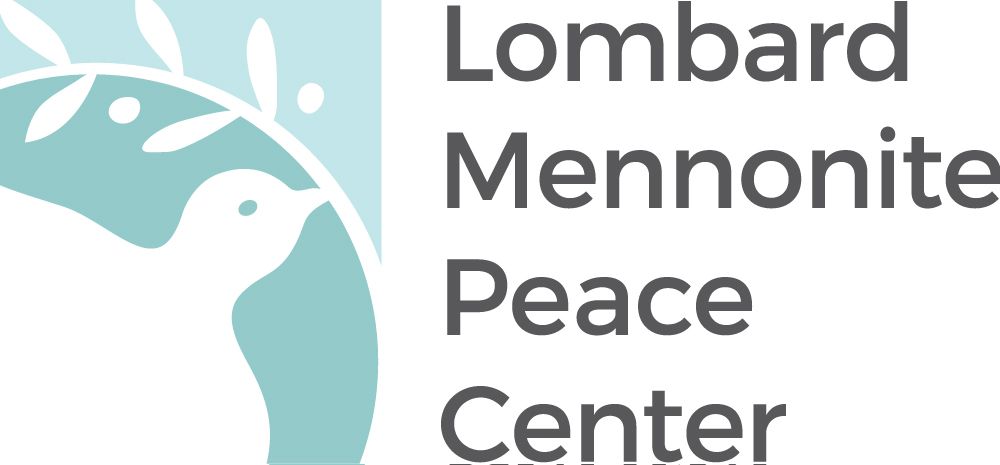History
Transforming Communities with Biblical Peacemaking

The Lombard Mennonite Peace Center (LMPC) ministry receives its impetus from Scripture: “All this is from God, who through Christ reconciled us to himself and gave us the ministry of reconciliation” (II Corinthians 5:18). Thus, LMPC seeks to ground its peacemaking in a biblical understanding of salvation and Christian discipleship.
The Lombard Mennonite Peace Center was founded in 1983 as a peace resource center overseen by a suburban Mennonite congregation. Serving primarily the Chicago Metropolitan area, LMPC provided both local churches and the broader public with speakers, audio-visual resources, and literature devoted to biblical peacemaking, including global issues such as the nuclear arms race. In the early years we also worked with educators in school settings to establish peer mediation programs.
As demand increased and its reputation spread, LMPC programs were made available nationwide. Multiple denominations encouraged their clergy members and lay leaders to attend our Mediation Skills Training Institute for Church Leaders. Seminary training often neglects issues regarding conflict transformation, so participants were eager to acquire the skills and knowledge that helped them deal more effectively with conflict.
During the 1990s our Director Emeritus, Richard Blackburn, provided training in conflict transformation in venues outside of the United States, including Yugoslavia, the United Kingdom, the Netherlands, and Switzerland. From 2006 to 2013 he taught summer courses in Florence, Italy on behalf of Southern Methodist University. More recently Reverend Blackburn has led a Peacemaker’s Pilgrimage to the Holy Land every other January.
In 1998 LMPC was reorganized as an independent not-for-profit ministry.
Throughout the years we have remained committed to a range of peace and justice concerns viewed from a biblical perspective. Our five-day Mediation Skills Training Institute for Church Leaders has been presented over 200 times involving more than 7,000 participants. We have become a nationally recognized ministry for training church leaders in understandings grounded in family systems thinking via our nine-day Clergy Clinic and Advanced Clergy Clinic. We also offer a variety of shorter workshops grounded in systems theory that are designed to help both clergy and lay leaders function in a more differentiated manner in the midst of congregational anxieties. Equally important as our workshops are the mediation services we offer to individuals, churches, and other organizations. Ultimately our mission is to help Christ’s church grow increasingly in health and wholeness, into all that God wants the church to be.
FAQs
-
How do I register for one of your events?
There are three ways to register: call our office with a credit card, fill out the form on the relevant brochure and mail it to us with a check, or register here on our website by following the links under our “Scheduled Training Sessions” tab. A standard service fee will be added for online registrations.
-
After I attend LMPC’s Mediation Skills Training Institute for Church Leaders (MSTI), am I certified as a mediator?
The Lombard Mennonite Peace Center is not an accredited academic institution; therefore, we do not grant official certification. However, participants who successfully complete the entire five-day session of MSTI are qualified and encouraged to present our Conflict Transformation Skills workshop in their own setting.
-
Can I get Continuing Education Units (CEUs) for attending one of your events?
LMPC is not an accredited institution and therefore does not issue CEUs; however, we can provide upon request a certificate documenting the number of contact hours earned by those who attend an LMPC event. We encourage you to contact your judicatory or denomination, as well as the institution that would be issuing your CEUs, and inquire about their requirements.
-
Do I have to first attend Mediation Skills Training Institute before I can attend Clergy Clinic: Intro to Family Systems?
No, that isn’t necessary; basically, each event stands on its own. Although you can benefit from taking Clergy Clinic: Intro to Family Systems without having first taken MSTI, many people find that MSTI provides a firm foundation that the more in-depth CC training then builds upon.
-
Do I have to attend Clergy Clinic: Intro to Family Systems to attend Advanced Clergy Clinic in Family Emotional Process?
Yes. Participants in the Advanced Clergy Clinic must have completed LMPC’s basic Clergy Clinic: Intro to Family Systems, attended the Advanced Clergy Clinic in a previous year, or been accepted into the program on the basis of documented background in Bowen family systems theory. If you do not fulfill any of these requirements but believe that you nonetheless have a particularly strong background in Bowen family systems theory, please contact us to see if ACC is appropriate for you.
-
Can LMPC come to my church / organization and present a workshop?
Yes! Please call LMPC at 630-627-0507 or email LMPC at Admin@LMPeaceCenter.org and speak with a staff member about the needs of your church or organization. The single-day workshops listed on the Scheduled Trainings page can be made available to your group. Mediation Skills Training Institute for Church Leaders is also available to judicatories and other groups.
-
I am a teacher. Do you have any resources that I can use?
Yes! We have a book and video library for you to use, as well as books available for purchase (see Recommended Reading under the Resources tab). We also offer conflict transformation training for administrators, teachers, and students. We have provided training and consultation for a number of schools to assist in the development of peer mediation programs. You can also contact us at 630-627-0507 or email us at Admin@LMPeaceCenter.org for more information.
-
I would like to help spread the word about LMPC workshops and training events. How can I help?
Thanks for asking! Here are a few ideas: Order materials from the LMPC office — such as Agreeing and Disagreeing in Love, an extremely popular pamphlet — and make them available to friends and colleagues. Download and distribute copies of our brochures to those who you believe might benefit from attending one of our workshops. Post an ad for an LMPC event in your church newsletter, on your denominational website, or on social media. Or it can be something as simple as recommending an LMPC event; in fact, word-of-mouth endorsements are probably our most effective form of advertising. Leaving reviews on Google, Facebook, and LinkedIn are also extremely helpful! Whatever you choose to do, thanks so much for supporting the mission and programs of LMPC!
-
I would like to support the work of the Lombard Mennonite Peace Center. How can I make a donation to LMPC?
The LMPC Peace Fund receives all donations, which provides partial registration assistance to those who otherwise would be unable to afford the registration fee for MSTI or LDTFS. You can donate by check or credit card. If you wish to donate by check, make the check out to “Lombard Mennonite Peace Center,” and mail it to: Lombard Mennonite Peace Center, 101 W. 22nd Street, Suite 206; Lombard, IL 60148. We will earmark those funds for the LMPC Peace Fund, unless you specify otherwise in the memo line. To donate by credit card, you can make a safe and secure donation on our website.
Also, some of our donors have included LMPC in their foundation giving or estate planning. Thank you for your generosity and your commitment to peace-building!
Glossary
Acute Anxiety
Reaction to specific events or issues; fear of what is.
Anxiety
The response of an organism to a threat, real or imagined.
Chronic Anxiety
Reaction to a disturbance in the balance of a relationship system; fear of what might be.
Conflict transformation
Theories and practices of responding to conflict that foster transformation and constructive outcomes. Conflict transformation views conflict as an opportunity for growth and change, rather than just a problem to be resolved.
Cut-off
The effort to manage the intense fusion through physical or emotion withdrawal from a relationship.
Differentiation
The capacity to be a discrete self while staying in contact with others.
Family systems theory
A theory of human behavior that “views the family as an emotional unit and uses systems thinking to describe the complex interactions in the unit.” This theory, developed by Dr. Murray Bowen, is used to explain how churches function as emotional systems, and to help church leaders respond to anxiety and conflict within systems.
Fusion
The degree to which one’s functioning is dependent upon the support and acceptance (or other response) of others.
Pseudo-Self
Beliefs and principles instantly adopted or modified to enhance one’s connection or image with others or to oppose others.
Reactivity
Automatic, instinctive responsiveness to others driven by emotional process.
Self-Differentiation
People’s capacity to calmly articulate what they think and value, and to act on that basis, while staying in active relationship with those who disagree.
Solid Self
Firmly held beliefs and principles formed slowly and changed only from within self.
Triangle
The smallest stable relationship unit; serves to shift anxiety from relationship to relationship.
Contact Information
PHONE: 630-627-0507
EMAIL: admin@lmpeacecenter.org
ADDRESS: 101 W. 22nd Street, Suite 206
Lombard, IL 60148
Subscribe to our Newsletter
© 2024 | Lombard Mennonite Peace Center | Website powered by Neon One


